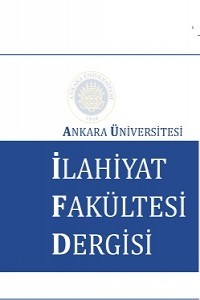Vahiy, iç söz ve yorum bağlamında Kelām-ı Nefsī tartışmasının hermenötik uzantıları
Ḫalḳu’l-Ḳurʾān tartışmasında Eşʿarī-Māturīdī düşüncenin belirleyici kavramı olan kelām-ı nefsī, hem vahyin nüzulünün keyfiyeti konusu hem de yorum meselesi ile irtibatlandırılabilir. Kelāmın ses ve harflerden müteşekkil olmayıp nefsteki (zihindeki) mana olduğu düşüncesi Kur’an lafızlarının anlama delaletinin doğrudanlığı-dolaylılığı konusunu derinden belirliyor görünmektedir. Hıristiyan teolojisinde bir bakıma kelām-ı nefsī kavramının muadili olarak geliştirilen “iç söz” (verbum interius) kavramının, Hans-Georg Gadamer tarafından hermenötik problemin evrenselliği noktasında yorumlanmış olması dikkate alındığında benzer ya da farklı hermenötik uzanımların kelām-ı nefsī çerçevesinde de izinin sürülmesi mümkündür. Bu çerçevede anlama hadisesinin dilselliği, yorumun anlamadaki rolü ve öznellik gibi başlıklar öncelikli olarak zikredilebilir. Bu makalede öncelikle kelām-ı nefsī kavramının İslam kelam disiplininin özgün tartışma alanı içerisindeki konum ve işlevi betimlenmiştir. Daha sonra kelām-ı nefsī kavramı hem verbum interius ile belirgin yönleri açısından mukayese edilmiş hem de hermenötik uzantıları çerçevesinde ele alınmıştır
The Hermeneutical Extensions of the Debate on al-Kalām al-Nafsī in the Context of Revelation, Inner Speech/Verbum Interius and Interpretation
The Hermeneutical Extensions of the Debate on al-Kalām al-Nafsī in the Context of Revelation, Inner Speech/Verbum Interius and Interpretation Al-kalām al-nafsī is the defining concept for the Ashʿarite-Māturīdite school of thought in the controversy over the creation of the Qur’an (khalq al-Qurʾān). As such, it is related to both the conditions of the revelation and hermeneutics of the Qur’an. The notion that the Word consists of the meaning in the nafs (intellect) rather than that of sounds and letters, seems to profoundly shape the quality and directness/indirectness of the signification of Qur’an’s words. If we consider that the Christian concept of verbum interius -developed for similar purposes to that of al-kalām al-nafsī- has been recently interpreted by Hans-Georg Gadamer in the context of the universality of hermeneutical problem, we may surmise that similar or different hermeneutical repercussions might also be traced for the latter term. Among these are the linguicity of understanding, the role of interpretation in understanding, and subjectivity. In this essay I compare the concept of al-kalām al-nafsī and verbum interius in terms of their most definitive features, and elaborate on the former’s hermeneutical repercussions
Keywords:
al-Kalām al-Nafsī, Inner Speech, Ashʿarites, Muʿtazīlites, Revelation, Interpretation,
___
- ez-Zerkeşī, Bedruddīn Muḥammed b. ʿAbdillāh. el-Burhān fī ʿUlūmi’l-Ḳurʾān. Tah. M. Ebū’l-Faḍl İbrāhīm. 4 c. Kahire: Dāru’t-Turās̠, 1984.
- et-Taftāzānī, Saʿduddīn Mesʿūd b. ʿUmer. Şerḥu’l-Maḳāṣid. Tah. ʿAbdurraḥmān ʿUmeyra. 5 c. Beyrut: ʿĀlemu’l-Kutub, 1998.
- es-Suyūṭī, Celāluddīn ʿAbdurraḥmān. el-İtḳān fī ʿUlūmi’l-Ḳurʾān. Tah. M. Ebū’lFaḍl İbrāhīm. 4 c. Kahire: el-Heyʾetu’l- ʿĀmme el-Miṣriyye li’l-Kitāb, 1974.
- eṣ-Ṣābūnī, Nūruddīn. Mâtürîdiyye Akaidi. Terc. Bekir Topaloğlu. İstanbul: Marmara Üniversitesi İlahiyat Fakültesi Vakfı Yayınları, 2011.
- Muhaṣṣalu Efkāri’l-Muteḳaddimīn ve’l-Muteʾaḫḫirīn mine’l-ʿUlemāʾ ve’lḤukemāʾ ve’l-Mutekellimīn. Tah. Ṭāhā ʿAbdurraʾūf Saʿd. Kahire: Mektebetu’l-Kulliyāt el-Ezheriyye, tsz.
- Meʿālimu Uṣūli’d-Dīn. Nşr. Semīḥ Duġaym. Beyrut: Dāru’l-Fikri’lLubnānī, 1992.
- er-Rāzī, Faḫruddīn. Ḫalḳu’l-Ḳurʾān beyne’l-Muʿtezile ve Ehli’s-Sunne. Tah. Aḥmed Ḥicāzī es-Seḳḳā. Beyrut: Dāru’l-Cīl, 1992.
- Özel, İsmet. “Tüfenk”, Erbain: Kırk Yılın Şiirleri (İstanbul: İklim Yayınları, 1987) içinde.
- el-Kāsānī, ʿAlāʾuddīn Ebū Bekr b. Mesʿūd. Bedāʾiʿu’ṣ-Ṣanāʾiʿ fī Tertībi’ş-Şerāʾiʿ. 7 c. Beyrut: Dāru’l-Kutubi’l-ʿİlmiyye, 1986.
- el-Ḳāḍī ʿAbdulcebbār. Şerḥu’l-Uṣūli’l-Ḫamse. Tah. ʿAbdulkerīm ʿUs̠mān. Kahire: Mektebetu Vehbe, 1996.
- Jensen, Alexander S. “The Inner Word: Augustine and Gadamer on Language, Meaning and Being,” Ľubica Učník ve Anita Williams (ed.), Phenomenology and the Problem of Meaning in Human Life and History (Nordhausen: Verlag Traugott Bautz, 2017) içinde, ss.265-275.
- The Philosophy of Gadamer. Terc. Kathryn Plant. Chesham: Acumen Publishing Limited, 2003.
- Grondin, Jean. Introduction to Philosophical Hermeneutics. Terc. Joel Weinsheimer. New Heaven: Yale University Press, 1994.
- el-Ġazālī, Ebū Ḥāmid. el-İḳtiṣād fī’l-İʿtiḳād. Tah. İ. Agâh Çubukçu ve Hüseyin Atay. Ankara: Ankara Üniversitesi İlâhiyat Fakültesi Yayınları, 1962.
- Hakikat ve Yöntem. Terc. Hüsamettin Arslan ve İsmail Yavuzcan. 2 c. İstanbul: Paradigma Yayıncılık, 2009.
- Gadamer, Hans-Georg. “The Universality of the Hermeneutical Problem,” David Linge (ed. ve terc.), Philosophical Hermeneutics (Londra: University of California Press, 1977) içinde, ss.3-17.
- Figal, Günter. “The Doing of the Thing Itself: Gadamer’s Hermeneutic Ontology of Language,” Robert J. Dostal (ed.), The Cambridge Companion to Gadamer (Cambridge & New York: Cambridge University Press, 2002) içinde, ss.102-125.
- el-Cuveynī, İmāmu’l-Ḥarameyn Ebū’l-Meʿālī ʿAbdulmelik. Kitābu’l-İrşād ilā Ḳavāṭiʿi’l-Edille fī Uṣūli’l-İʿtiḳād. Tah. Muḥammed Yūsuf Mūsā ve ʿAbdulmunʿim ʿAbdulḥamīd. Kahire: Mektebetu’l-Ḫāncī, 1950.
- el-Curcānī, es-Seyyid eş-Şerīf. Şerḥu’l-Mevâḳıf: Mevâkıf Şerhi. 3 c. Terc. Ömer Türker. Ed. İbrahim Halil Üçer. İstanbul: Türkiye Yazma Eserler Kurumu Başkanlığı, 2015.
- Backman, Jussi. “Hermeneutics and the Ancient Philosophical Legacy,” Niall Keane ve Chris Lawn (ed.), The Blackwell Companion to Hermeneutics (Oxford: Wiley Blackwell, 2016) içinde, ss.22-33.
- Ayers, Robert H. Language, Logic, and Reason in the Church Fathers. New York: Georg Olms Verlag Hildesheim, 1979.
- Augustine. On The Trinity: Books 8-15. Terc. Stephen McKenna. Ed. Gareth B. Matthews. New York: Cambridge University Press, 2002.
- ISSN: 1301-0522
- Yayın Aralığı: Yılda 2 Sayı
- Başlangıç: 1952
- Yayıncı: ANKARA ÜNİVERSİTESİ > İLAHİYAT FAKÜLTESİ
Sayıdaki Diğer Makaleler
İsa’nın Yeni Ahit’te “Tanrı Oğlu” olarak tanımlanması meselesi
El-Fārābī’de Tanrı ve nihailik
Kur’an terimlerinin semantik çok katmanlılığı
Vahiy, iç söz ve yorum bağlamında Kelām-ı Nefsī tartışmasının hermenötik uzantıları
İslam din eğitimi için alternatif bir model: eleştirel din eğitimi yaklaşımı
